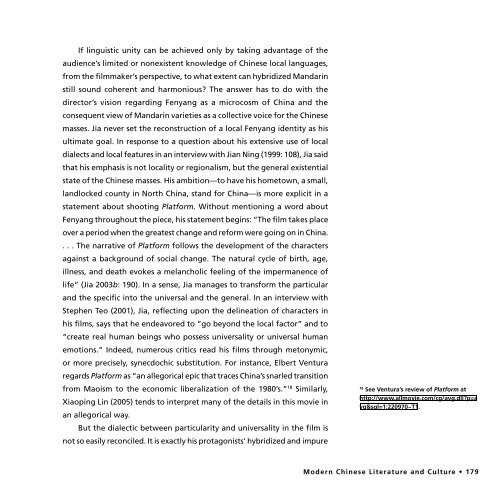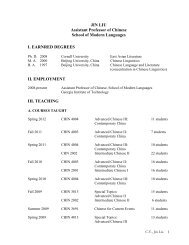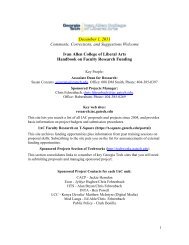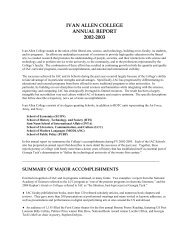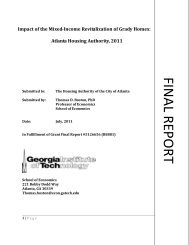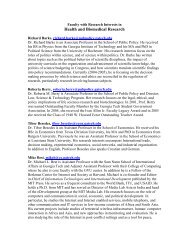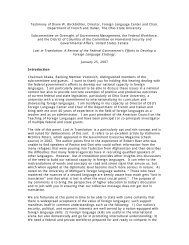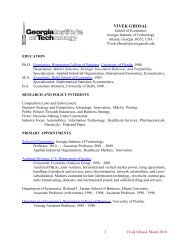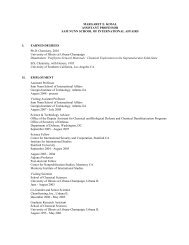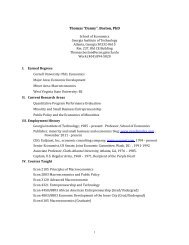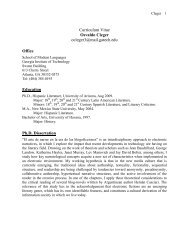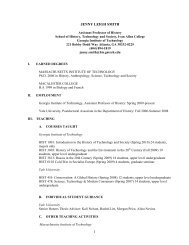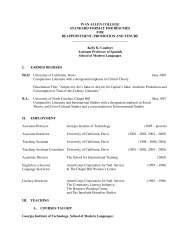Read this paper
Read this paper
Read this paper
Create successful ePaper yourself
Turn your PDF publications into a flip-book with our unique Google optimized e-Paper software.
If linguistic unity can be achieved only by taking advantage of the<br />
audience’s limited or nonexistent knowledge of Chinese local languages,<br />
from the filmmaker’s perspective, to what extent can hybridized Mandarin<br />
still sound coherent and harmonious? The answer has to do with the<br />
director’s vision regarding Fenyang as a microcosm of China and the<br />
consequent view of Mandarin varieties as a collective voice for the Chinese<br />
masses. Jia never set the reconstruction of a local Fenyang identity as his<br />
ultimate goal. In response to a question about his extensive use of local<br />
dialects and local features in an interview with Jian Ning (1999: 108), Jia said<br />
that his emphasis is not locality or regionalism, but the general existential<br />
state of the Chinese masses. His ambition—to have his hometown, a small,<br />
landlocked county in North China, stand for China—is more explicit in a<br />
statement about shooting Platform. Without mentioning a word about<br />
Fenyang throughout the piece, his statement begins: “The film takes place<br />
over a period when the greatest change and reform were going on in China.<br />
. . . The narrative of Platform follows the development of the characters<br />
against a background of social change. The natural cycle of birth, age,<br />
illness, and death evokes a melancholic feeling of the impermanence of<br />
life” (Jia 2003b: 190). In a sense, Jia manages to transform the particular<br />
and the specific into the universal and the general. In an interview with<br />
Stephen Teo (2001), Jia, reflecting upon the delineation of characters in<br />
his films, says that he endeavored to “go beyond the local factor” and to<br />
“create real human beings who possess universality or universal human<br />
emotions.” Indeed, numerous critics read his films through metonymic,<br />
or more precisely, synecdochic substitution. For instance, Elbert Ventura<br />
regards Platform as “an allegorical epic that traces China’s snarled transition<br />
from Maoism to the economic liberalization of the 1980’s.” 18 Similarly,<br />
Xiaoping Lin (2005) tends to interpret many of the details in <strong>this</strong> movie in<br />
an allegorical way.<br />
But the dialectic between particularity and universality in the film is<br />
not so easily reconciled. It is exactly his protagonists’ hybridized and impure<br />
18<br />
See Ventura’s review of Platform at<br />
http://www.allmovie.com/cg/avg.dll?p=a<br />
vg&sql=1:220970~T1.<br />
Modern Chinese Literature and Culture • 179<br />
MCLC 18.2.indd 179<br />
12/20/06 2:01:37 PM


